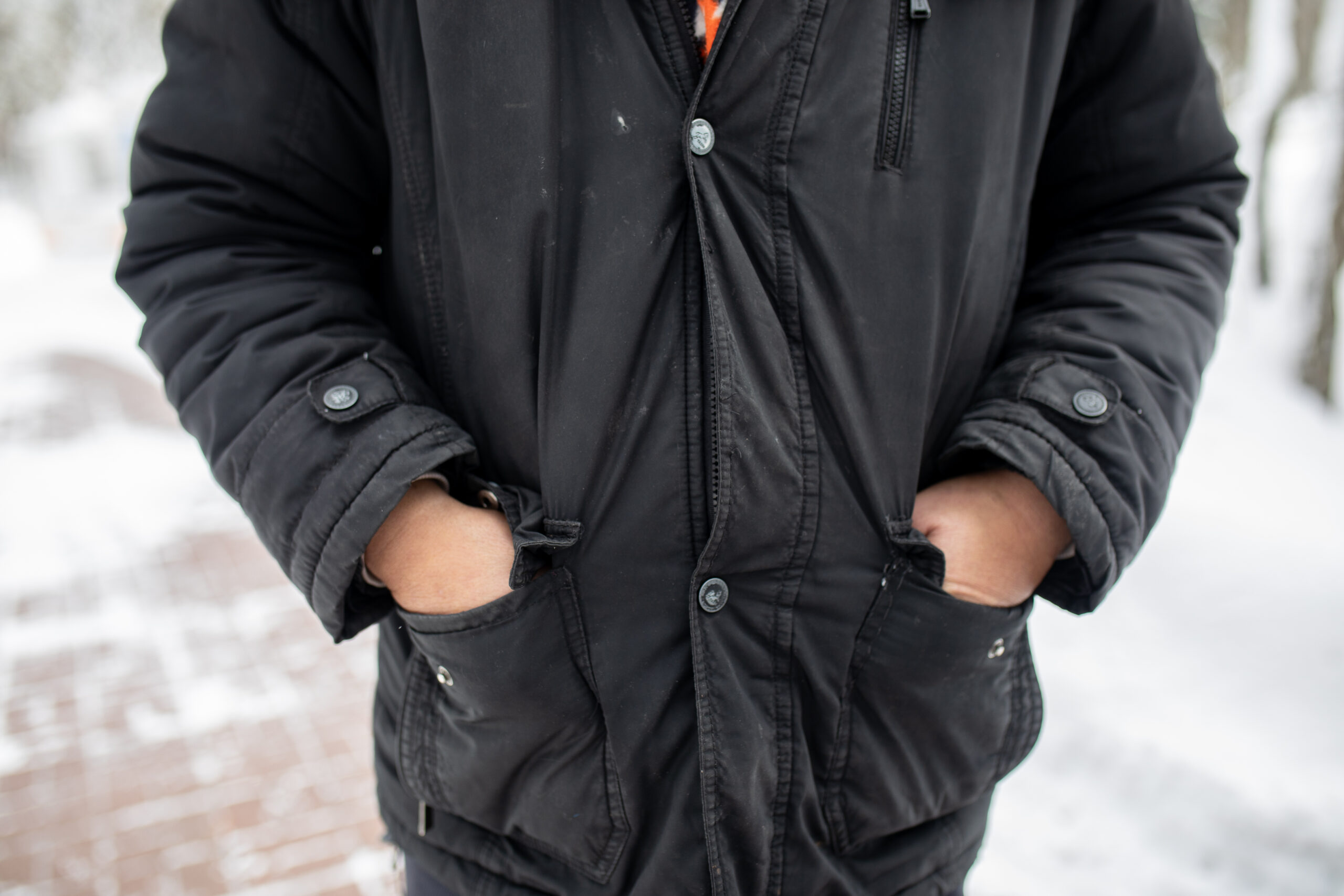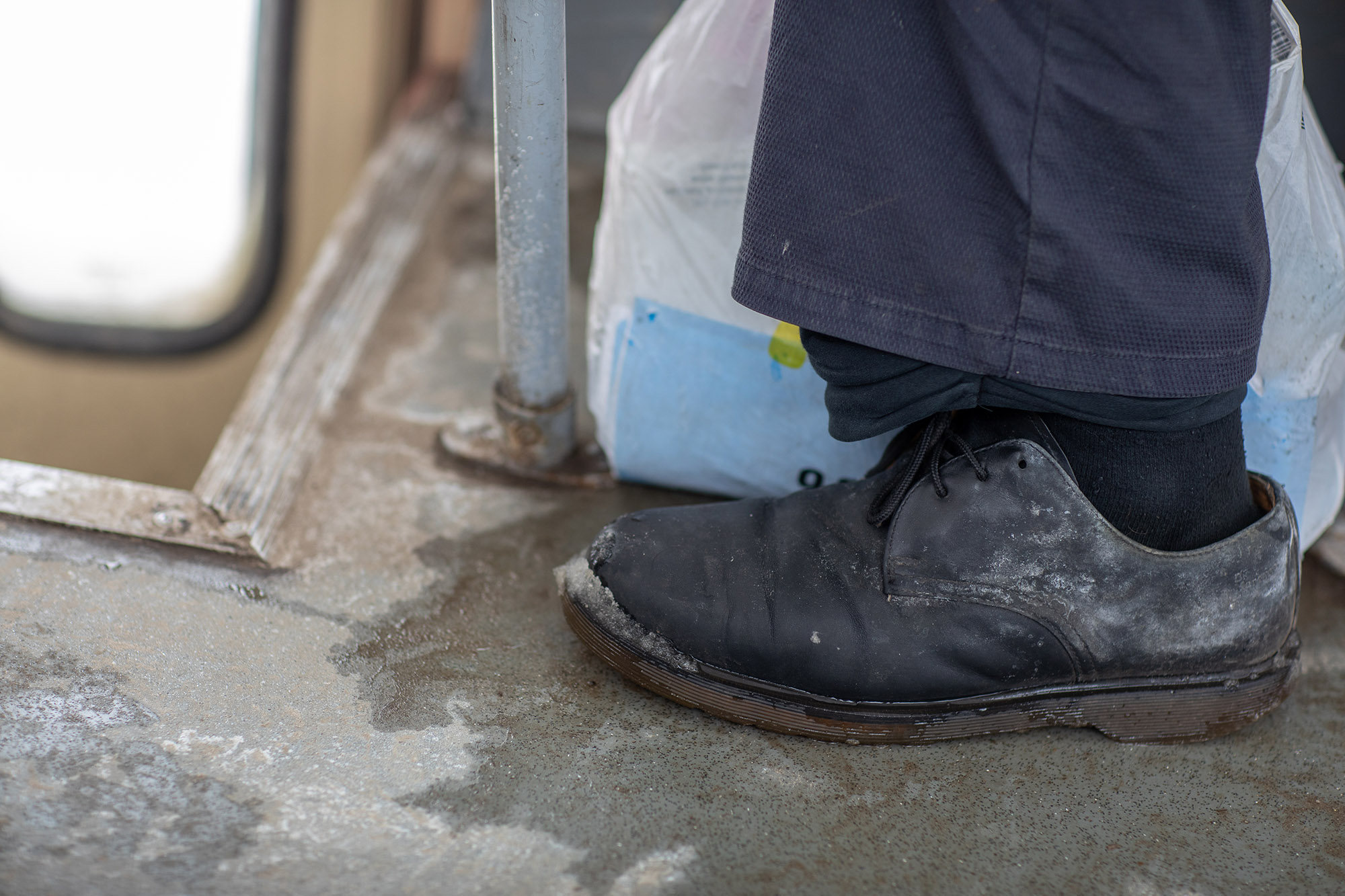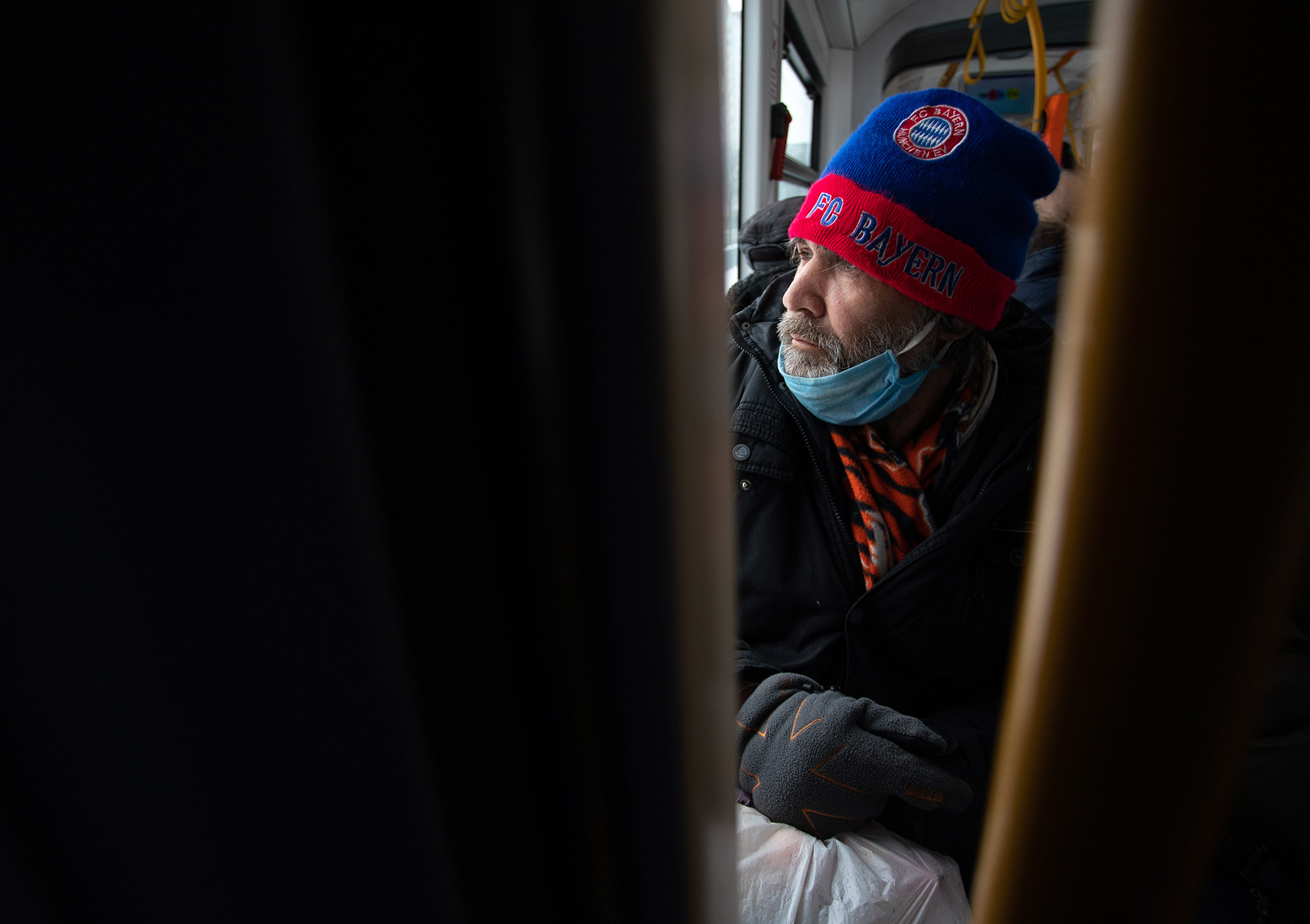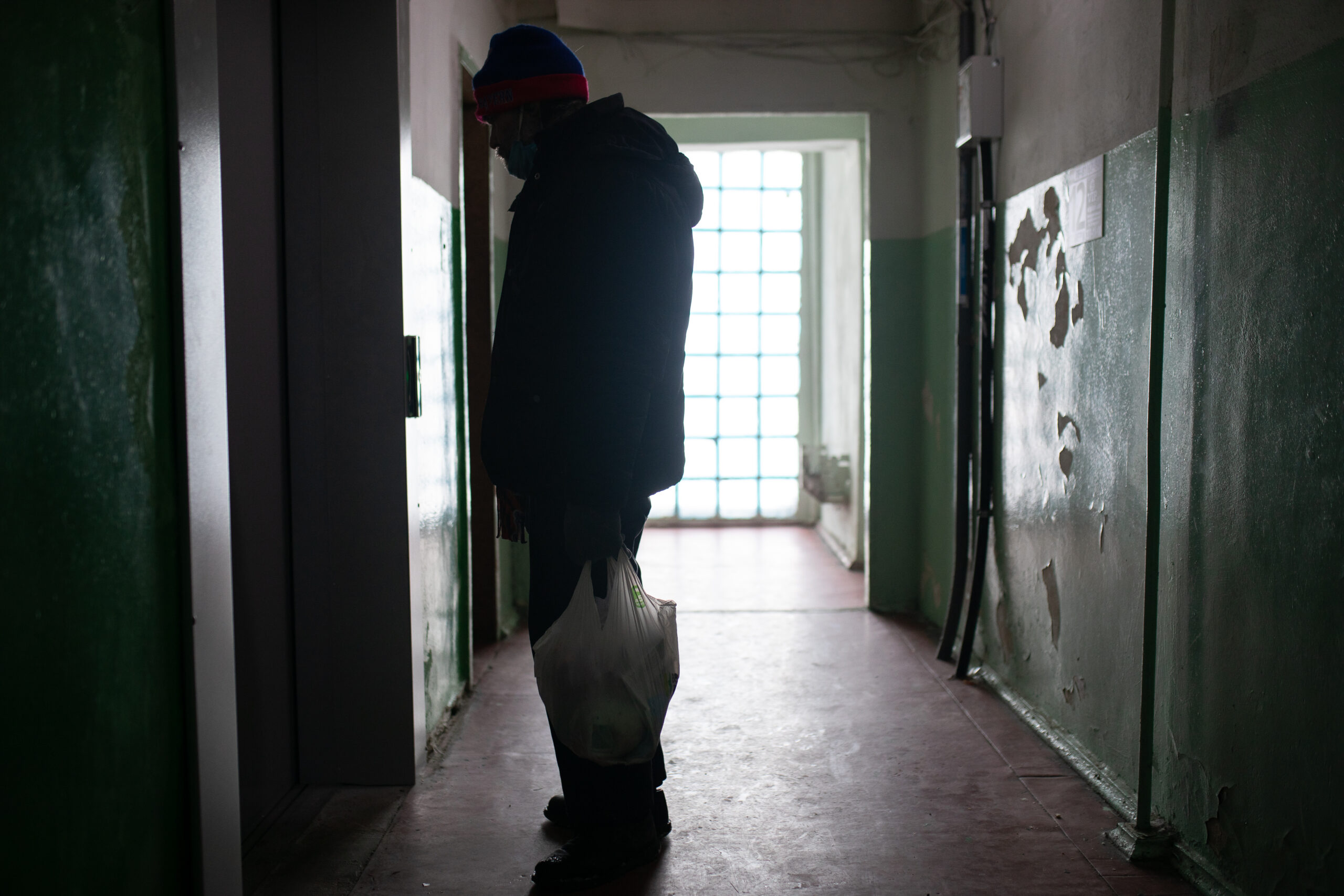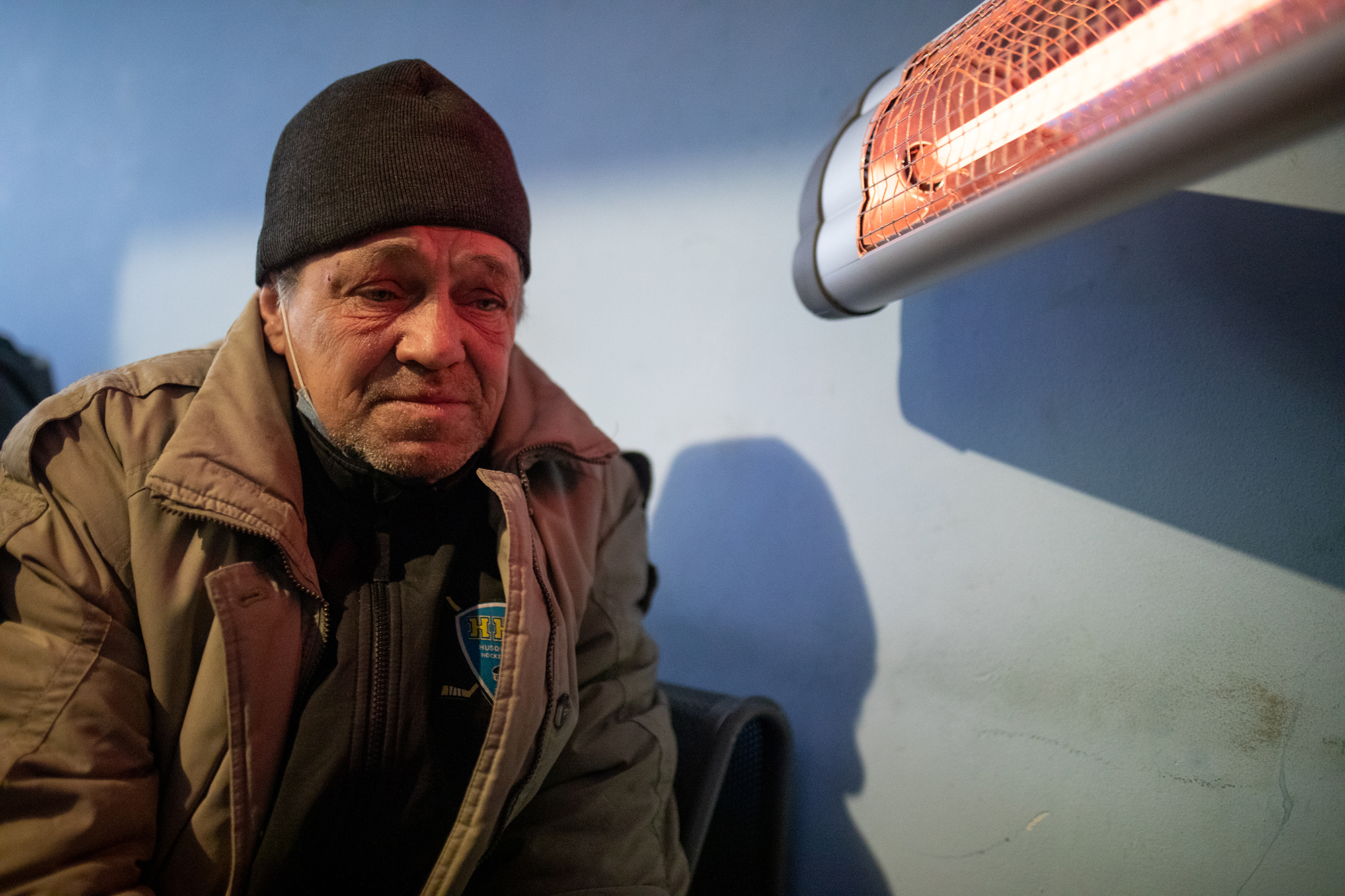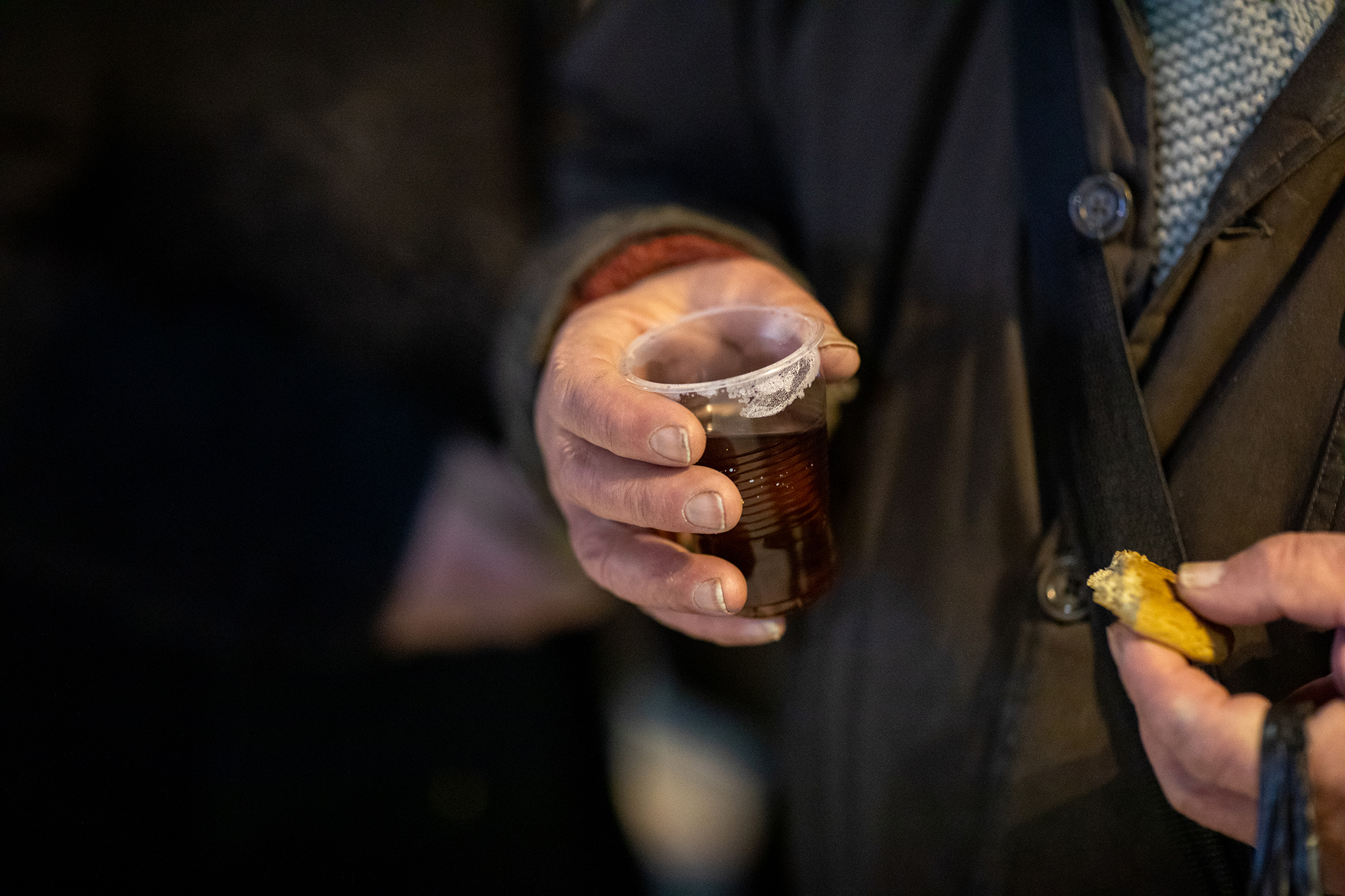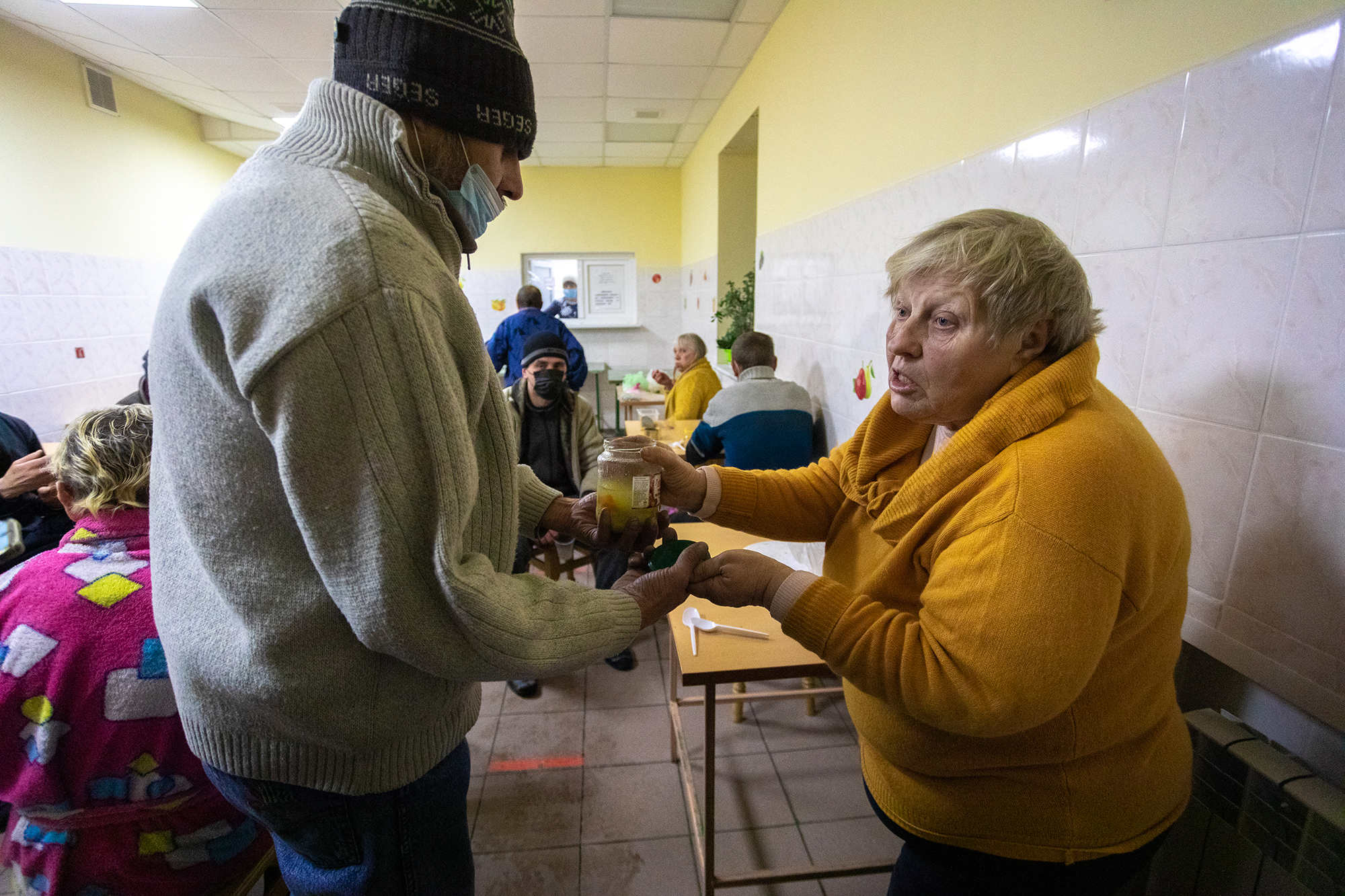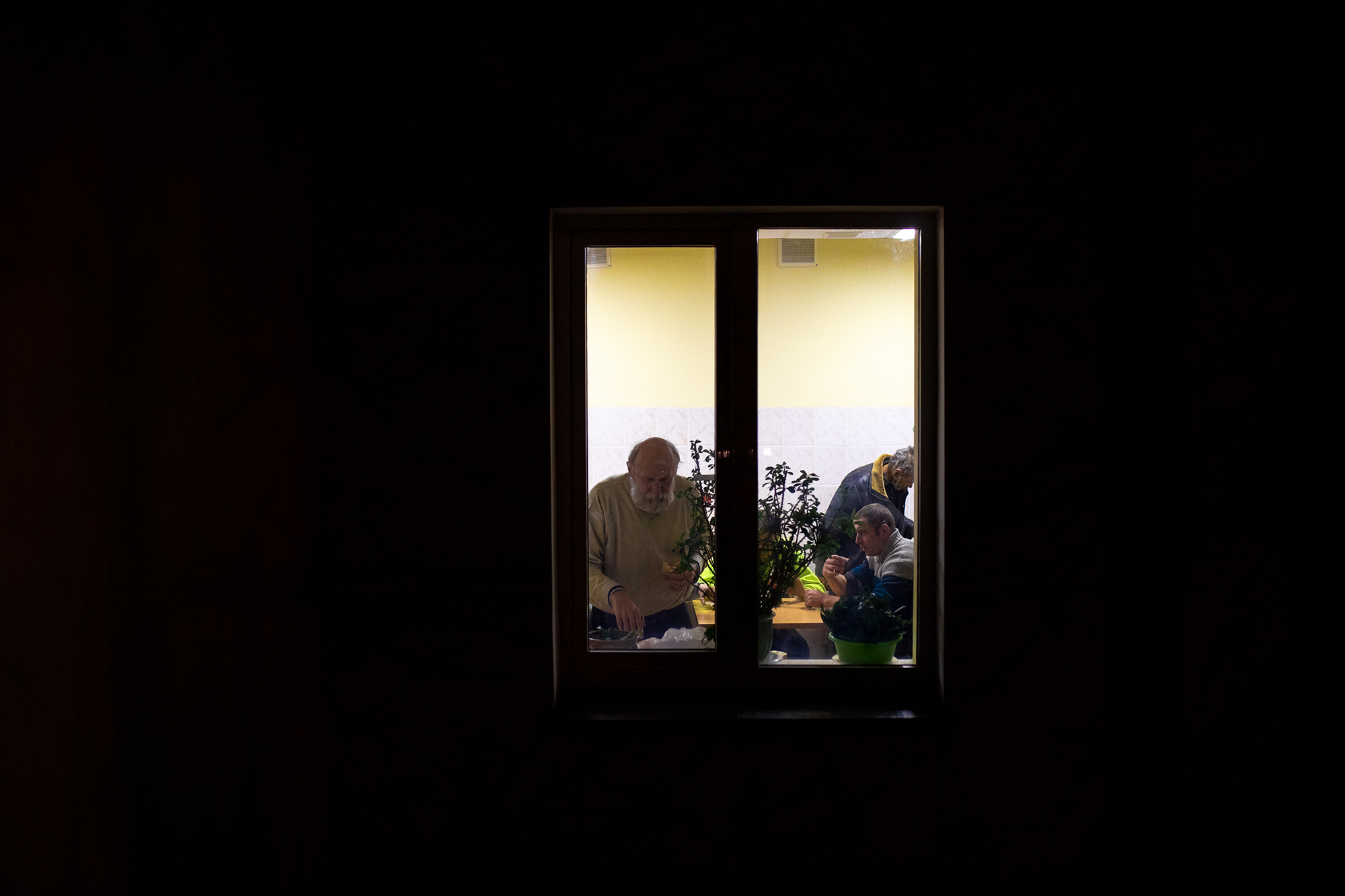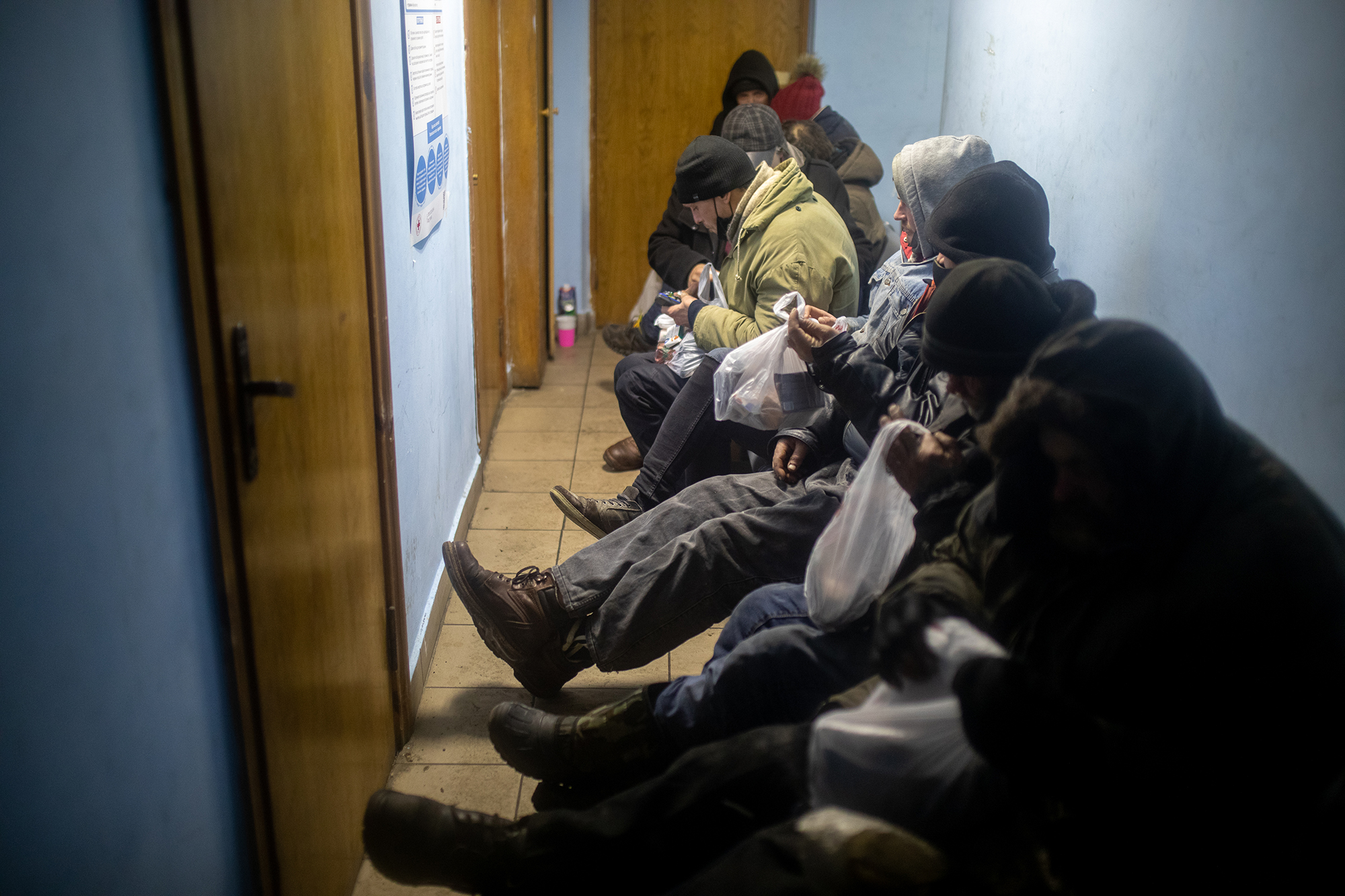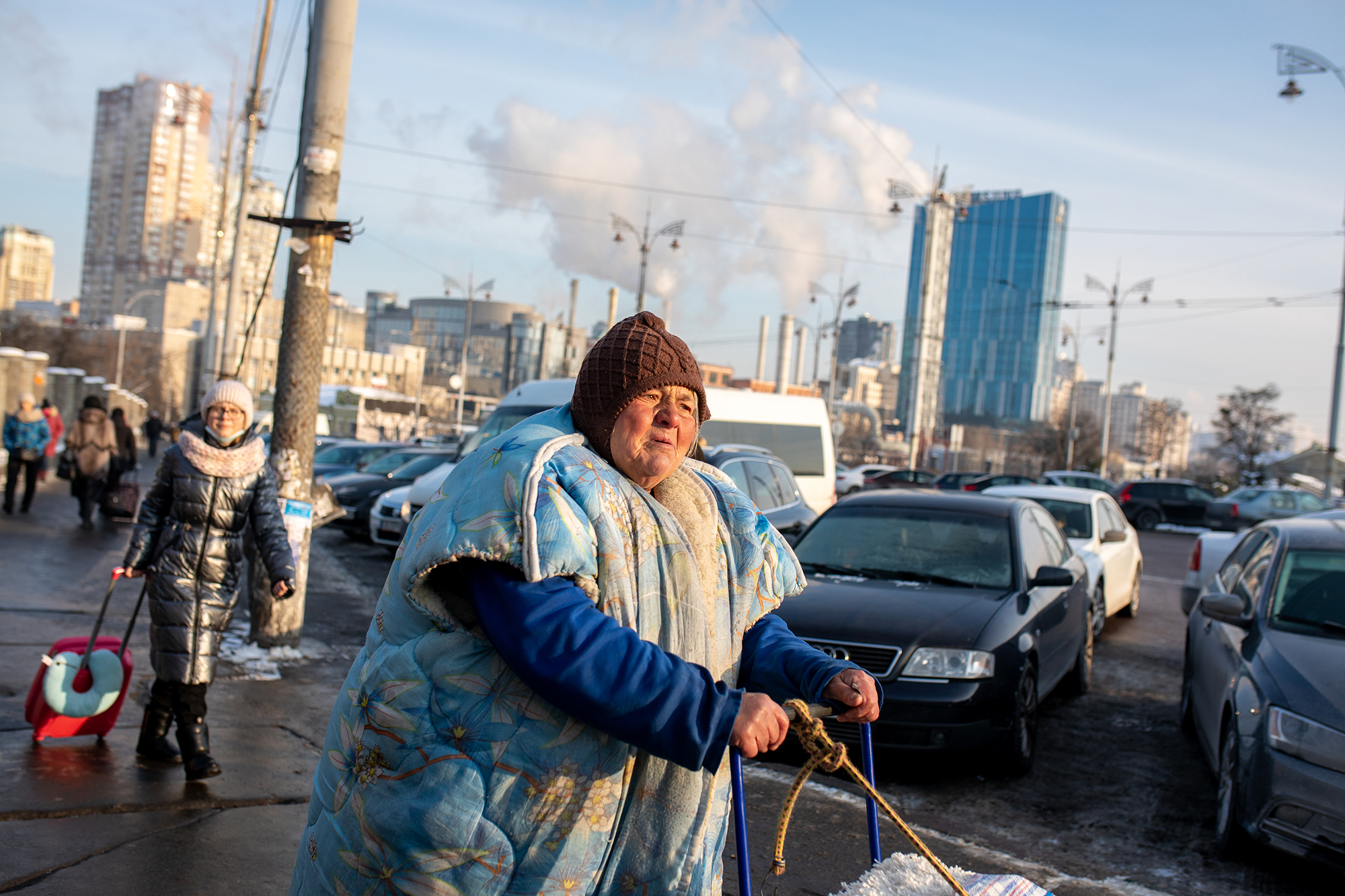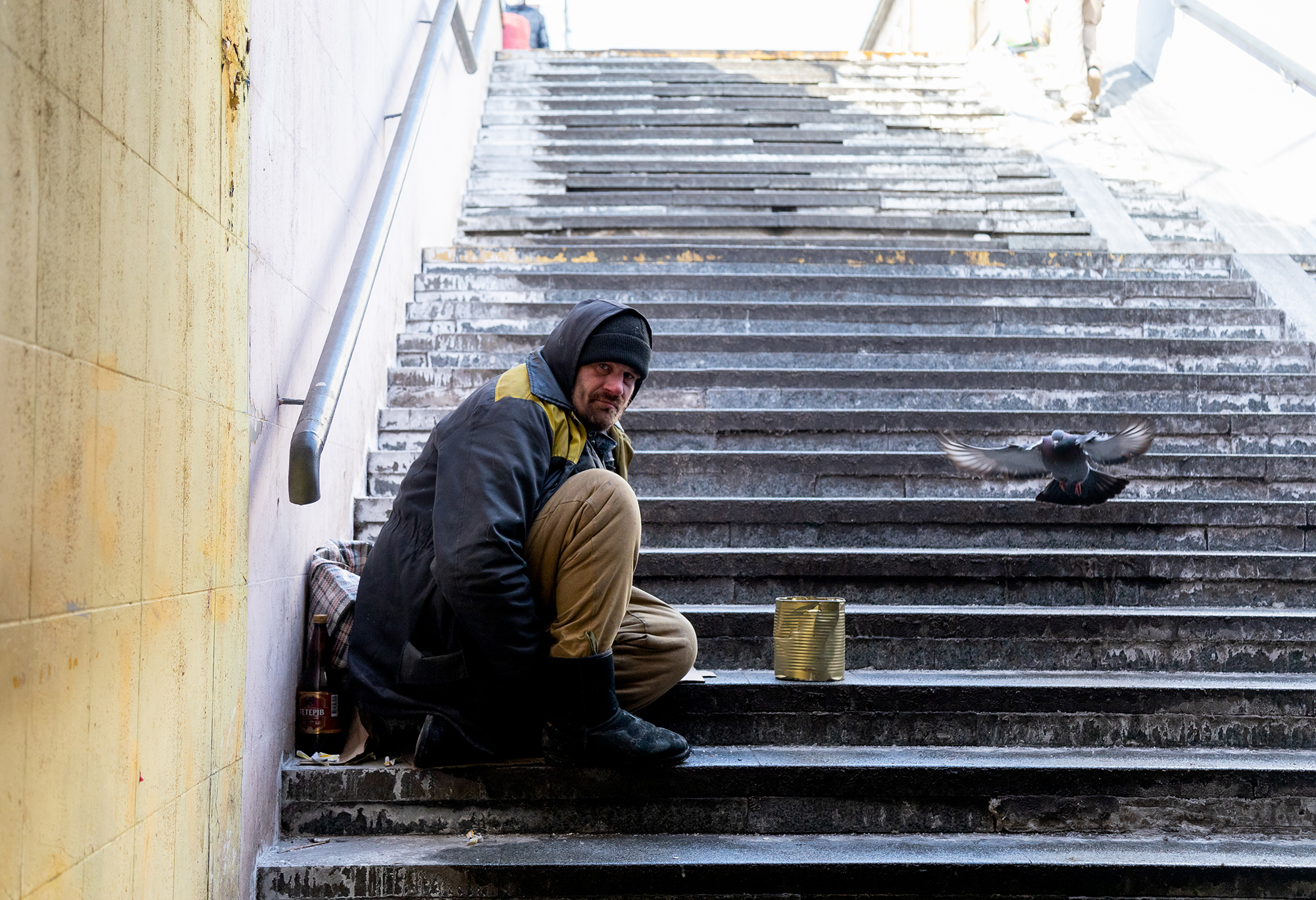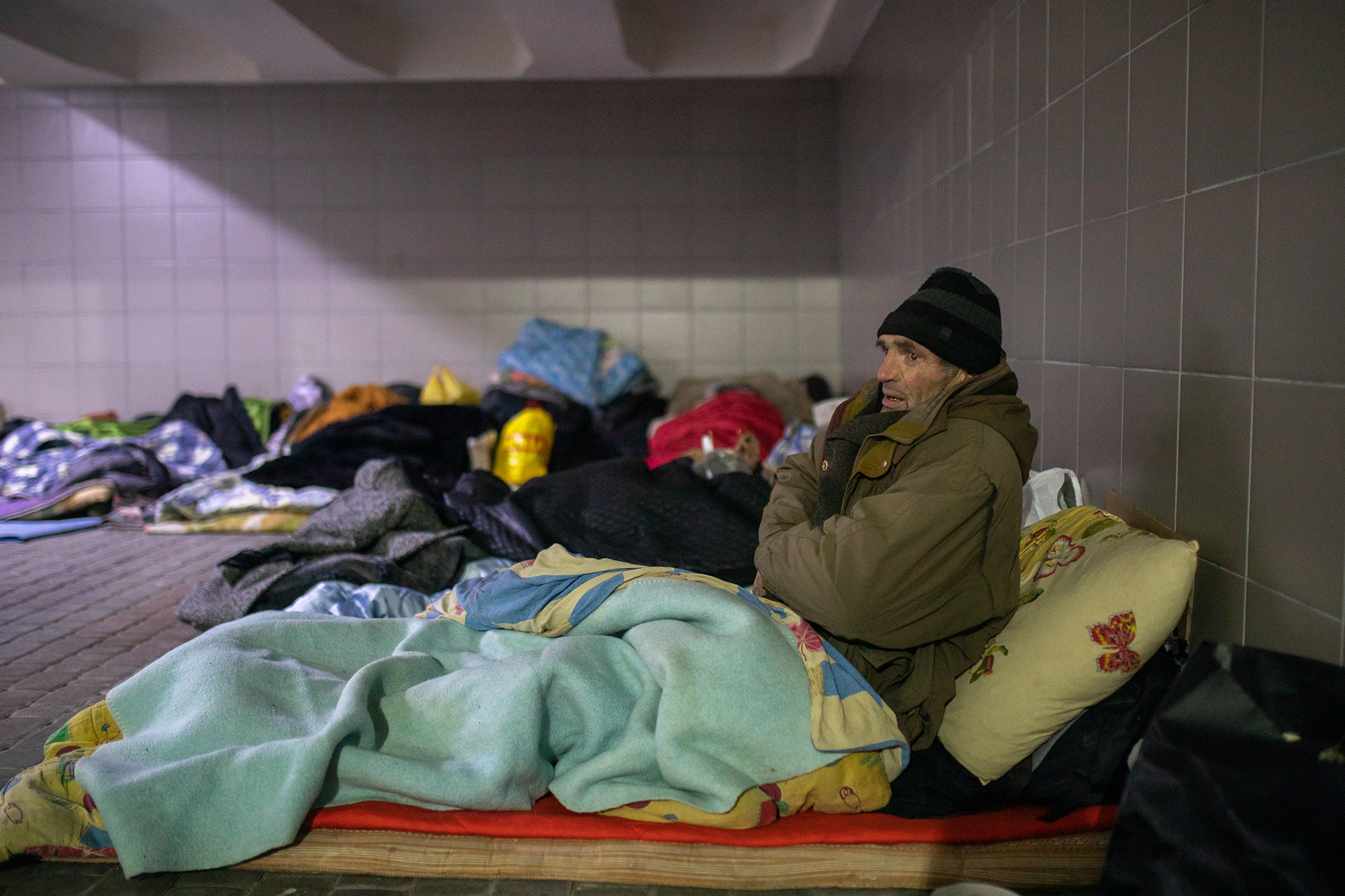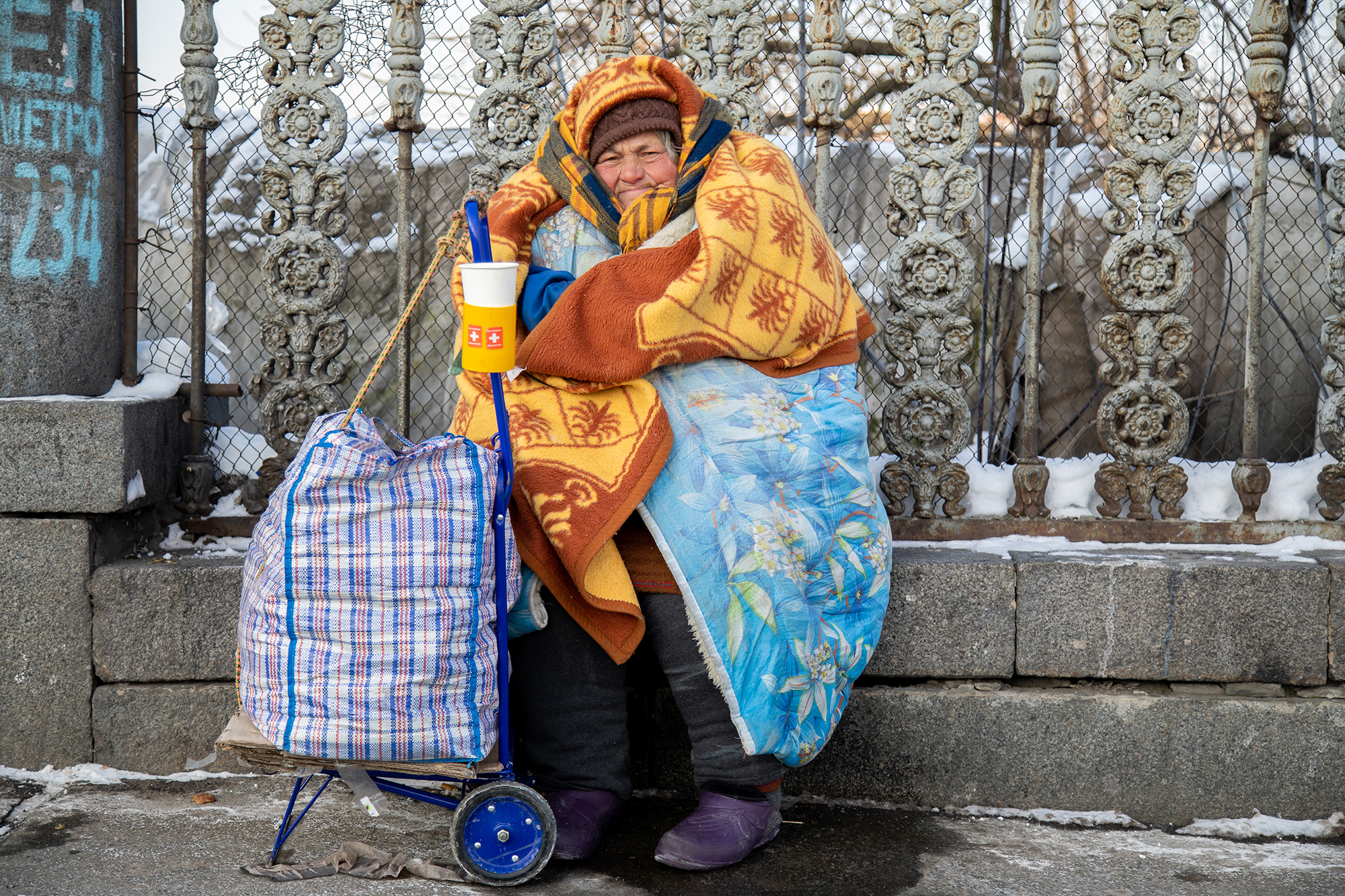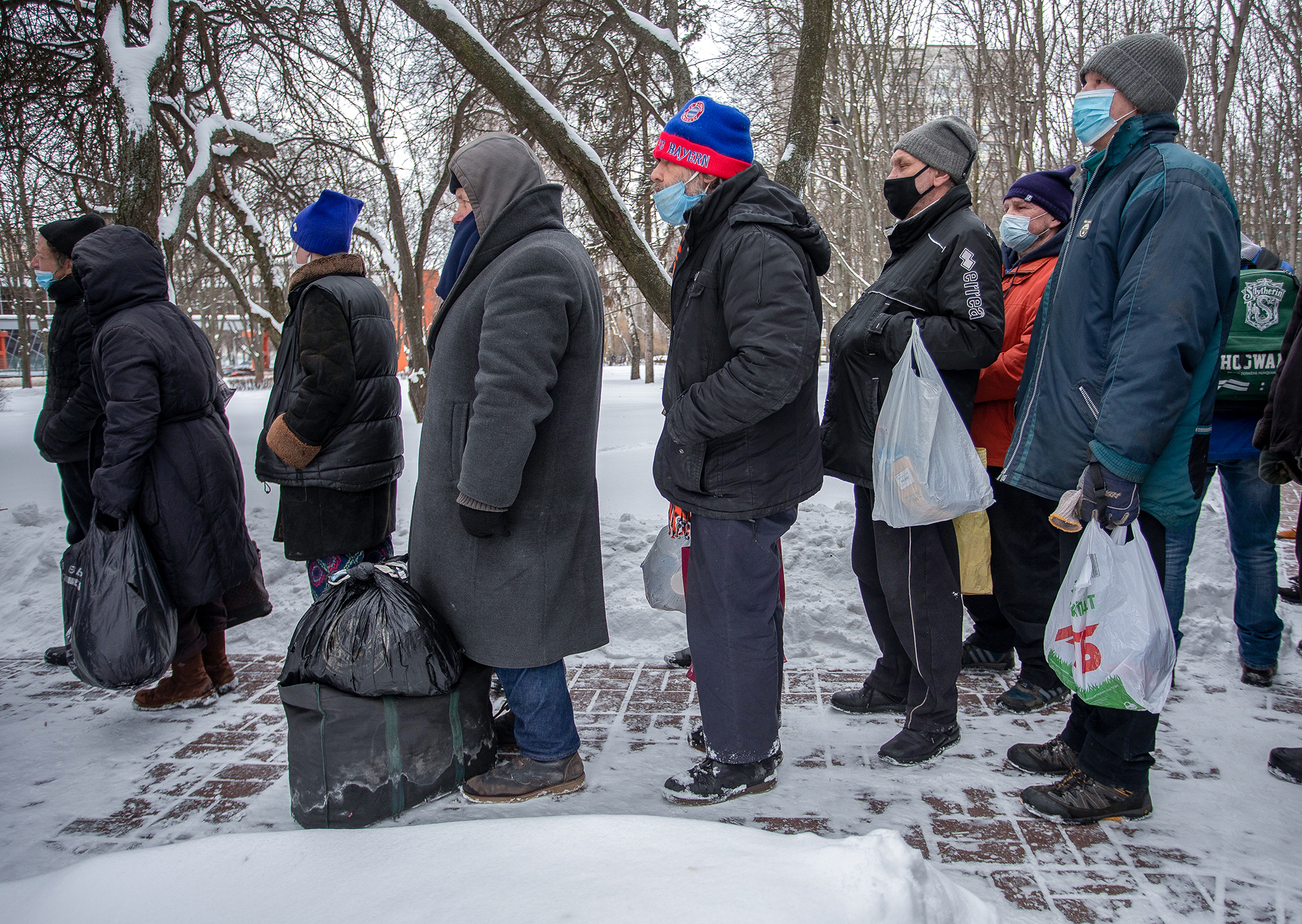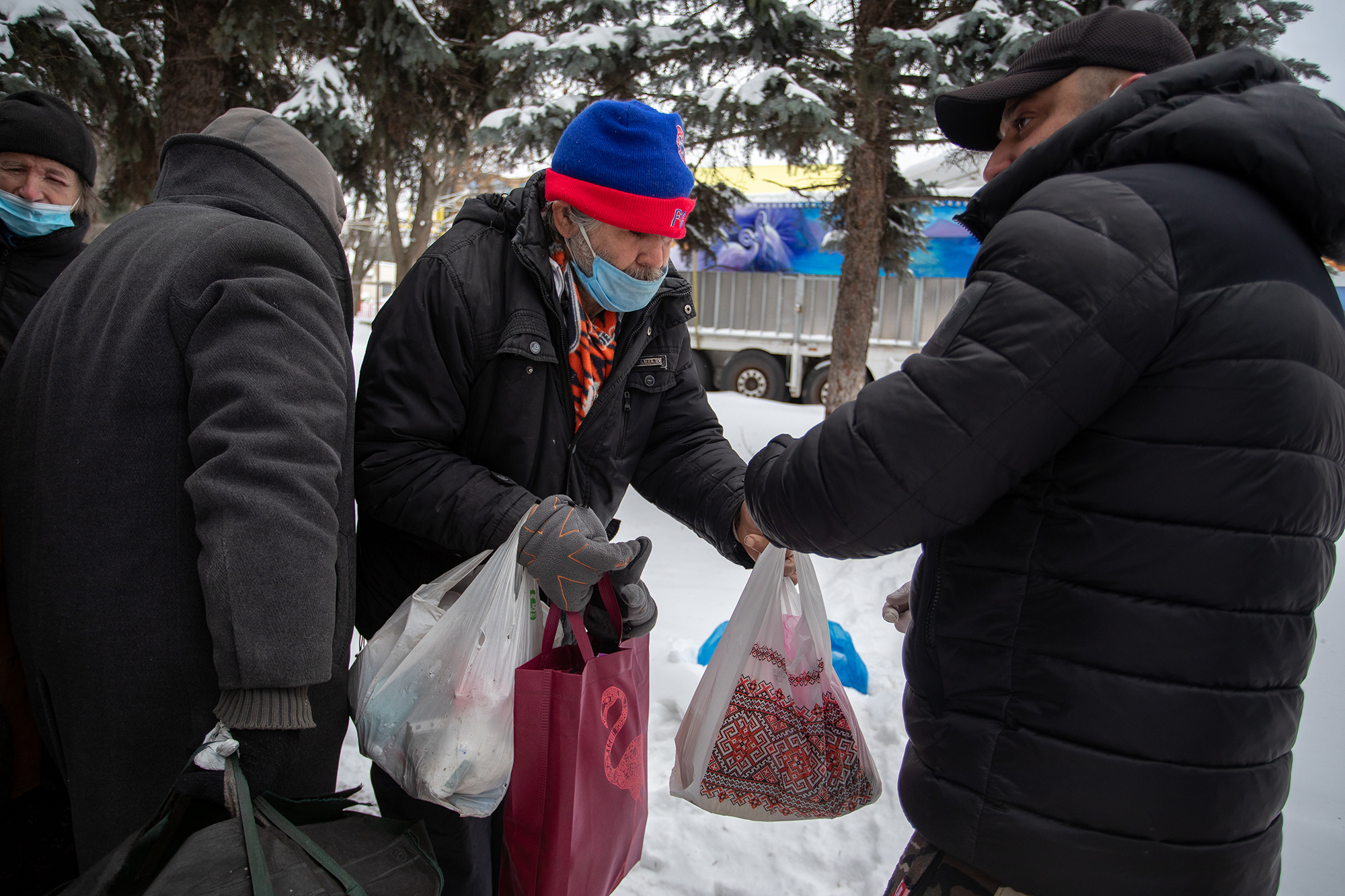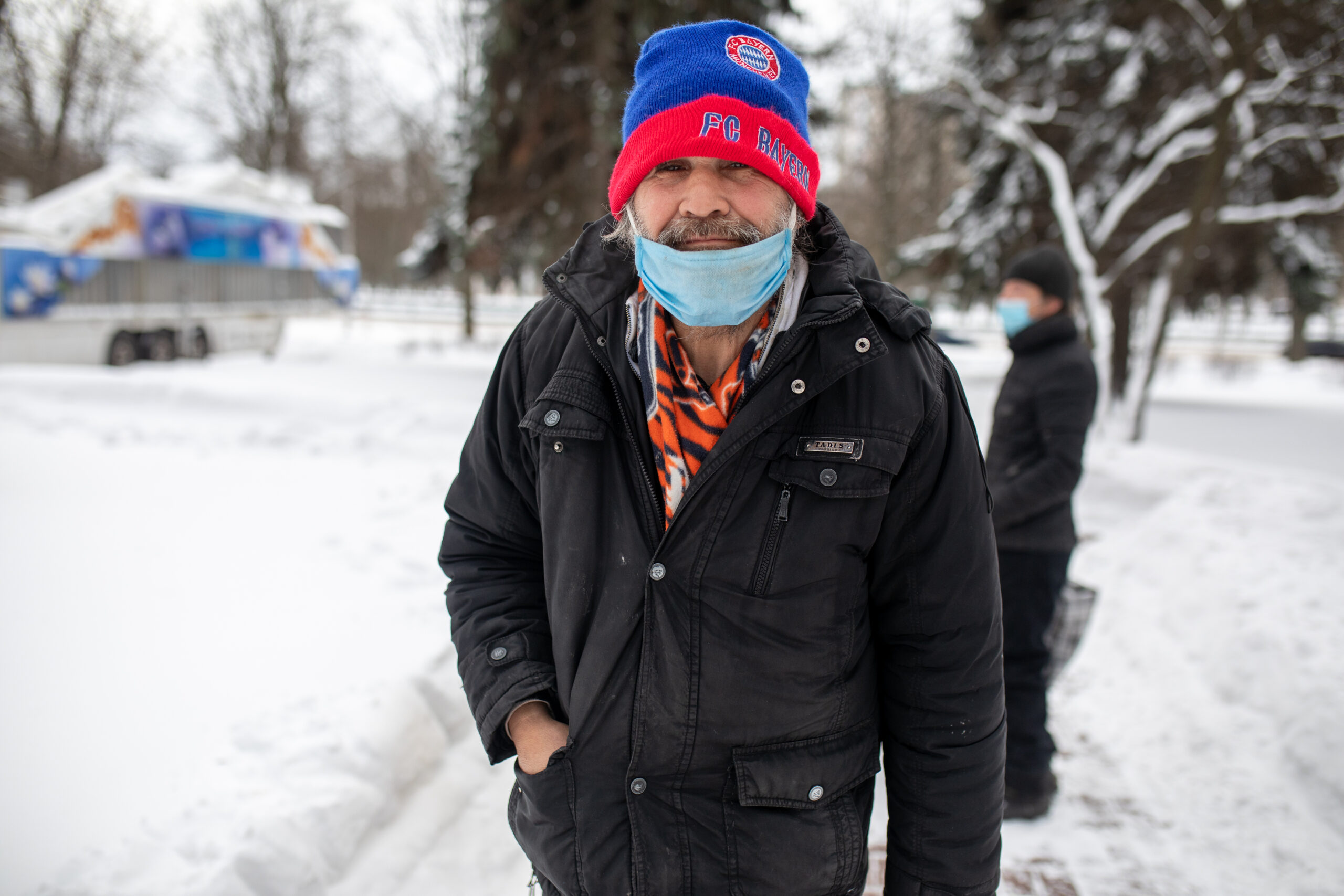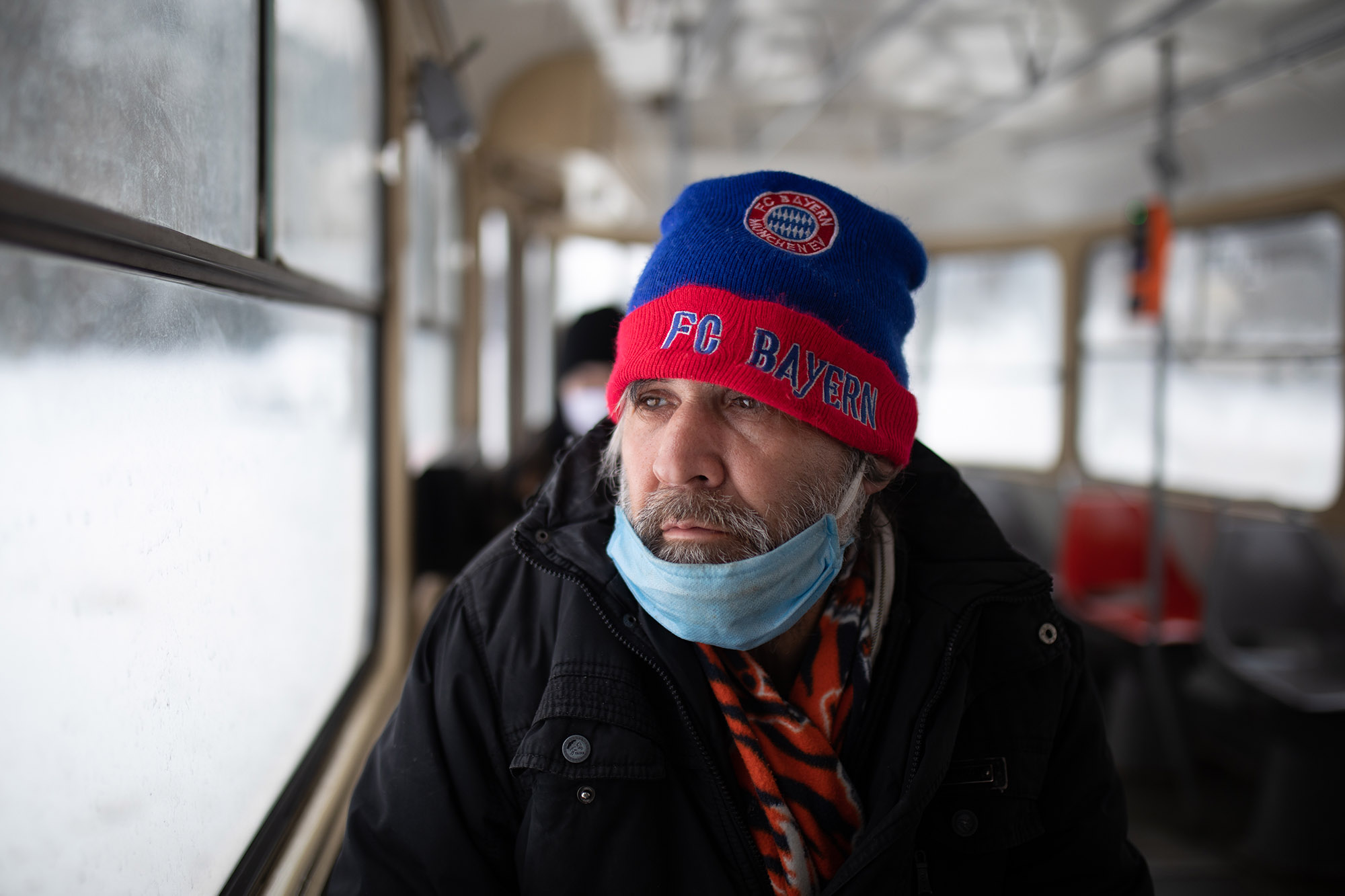
The Last Floor
He is anxiously watching the world outside through the dim window of a subway station. It seems like a policeman is approaching him. But no, he is not. The policeman needs an ATM nearby. The man looks away and through the window again.
At Lukyanivska station, at nine in the morning, as we agreed. If Hennadii had not kept his promise, it would not have been possible to contact him. He has no phone.
“Have you eaten yet today?” I ask him.
“No.”
***
We leave the lobby of the station into a flaky snow flurry. It sure beats the prickly evil sleet that fell from the sky yesterday. Hennadii is wearing demi-season shoes covered in salt stains. With each step his pants bounce upwards, exposing a thin holey sock. A bare neck behind a carelessly tied scarf must be the least of his problems. The most notable piece of his outfit for taking on the world is a blue and red hat pulled to his eyes with the logo of the German football club Bayern Munich.
“Aren’t you cold?”
“It’s warm today. Yesterday was cold.”
At first, Hennadii is not very talkative, reluctant to even say who he is and where he comes from. He was born in Kursk, but he considers himself Ukrainian. As proof of this he tells me his family name, ending with -enko. He has worked in various places. His last job was in printing. He has no wife and no children. He used to live with his mother, but she passed away in 2014.
After a hot dog and a cup of Americano with milk, Hennadii softens.
“My father lives in Moscow,” he tells me his father’s name and year of birth. “But I do not remember his address. I was thinking of going to the Russian embassy and asking them to find him.”
“Why?”
“Perhaps I could go live with him.”
The last time he talked to his father was in the late 1980s. Hennadii has no idea whether his father is dead or alive.
***
Hennadii found himself in difficult circumstances, as we usually refer to someone’s personal hell. As you do, he met the devil there. Hennadii was dealt a devil in the guise of a swindler. Swindlers have a flair for difficult circumstances.
“I had to repay a loan. He advised me: we will sell your apartment, you will repay your debts, and then I will help you buy a new one. In the end, instead of an apartment, he foisted me a room, claiming it was the only thing I could afford.”
“Why did you refuse?”
“After having my own apartment I did not want to move into a room.”
Hennadii’s ancient Greek name suits him. He is noble at heart.
He needed a loan to repay his debts. He says that debts have piled up due to low wages and monthly loans to make ends meet before pay day.
“And where did the money which you were going to use to buy a new apartment go?”
“After the loan was paid off, I only had 50,000 left.”
“How did you spend it?”
“On rent.”
***
There is a gaggle of women with cardboard signs held to their chests at the railway station. Apartments for rent by the day. Hennadii got interested.
“It was in a beautiful place—Syrets district, a forest nearby. And the apartment. . . A fridge that did not require defrosting. A stove that lit without a lighter,” Hennadii is excited. “The only problem was I could not afford it. Two thousand for three days.”
“How long did you stay there?”
“Three weeks.”
Hennadii moved into a hostel. But the last of the money runs out very quickly. So he found himself on the street.
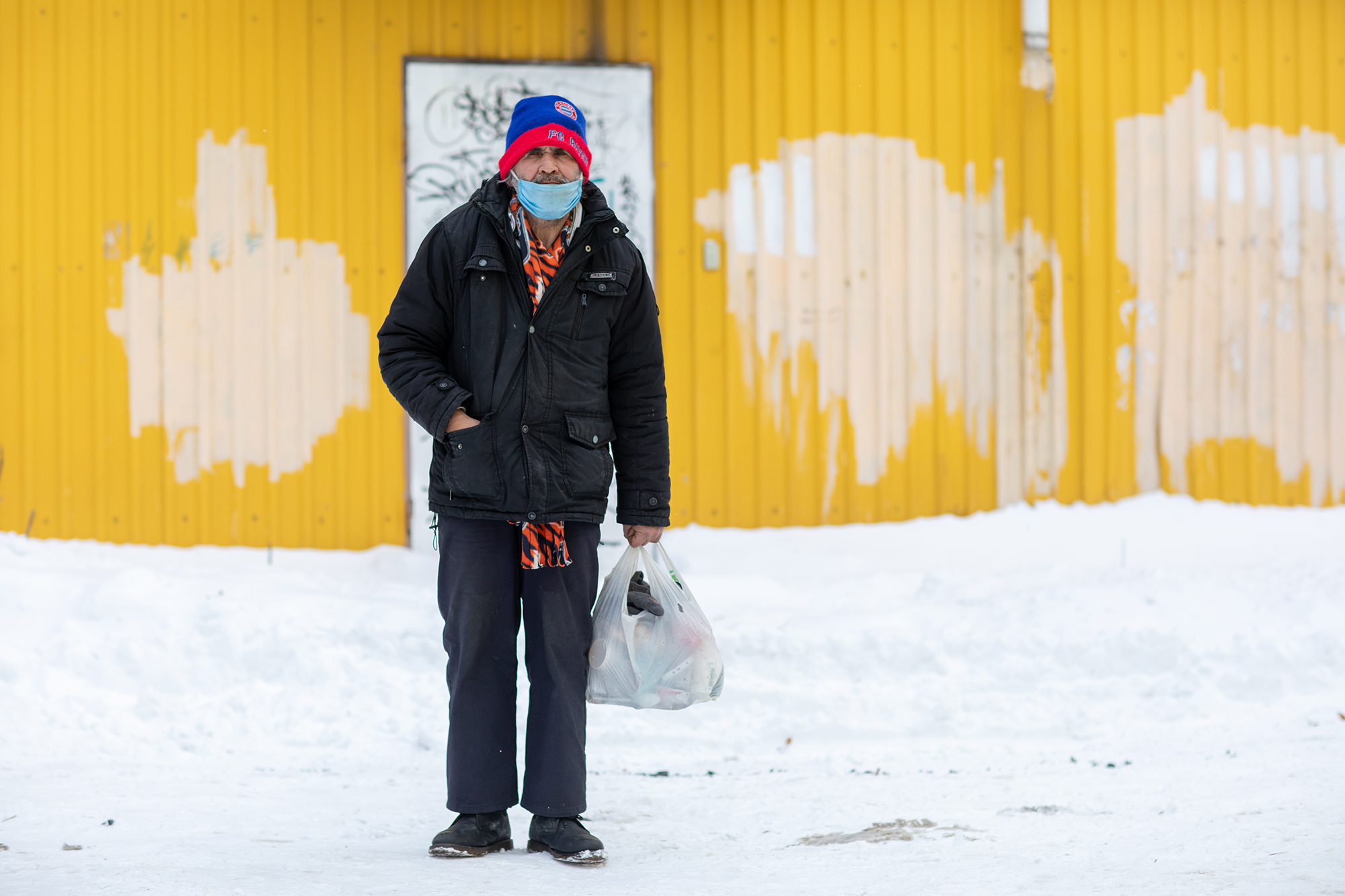
The city authorities count that there are almost four thousand homeless people in Kyiv. Yet, this figure only includes those registered at the Homeless Registration Center. The real figure, as it suits anything real, is hardly known.
***
We approach an apartment block near the subway station.
“There, do you see the white windows on the 14th floor? The new owners renovated and changed the windows. Now we will go to my place.”
“Did you go to the police?”
“I went to see a lawyer with my contract. He read it and said that nothing could be done.”
We are waiting for somebody to come out of the front door. As soon as it opens, Hennadii starts running. A stylishly dressed young man notices the photographer—and holds the door open.
A brand new elevator takes us to the 12th floor. There is a utilities box in the hallway, where Hennadii keeps all his simple belongings. A roll mat, a backpack, a few pieces of cardboard. They are neatly ordered in the box.
Every night Hennadii gets his roll mat and pieces of cardboard out of the box. He takes them to his last floor. Under his door of someone else’s apartment, he settles down for the night in a cozy corner with a radiator. Even a corner can be cozy.
Hennadii does not complain about the neighbors or the new owners of the apartment. He is polite and people leave him be.
“There, have a look,” as we leave, he invites me to take a peek through the hole in the outer double doors shared by two apartments. “Mine is the one on the right.”
Showing his past life in the apartment, Hennadii does not use the word “former”.
***
“Everything you see—serving lunches, warm clothes, roll mats—is all the exclusive initiative of public and religious organizations,” says Oleksii Khyzhniakov, coordinator of the Community of Sant’Egidio (in Ukraine they have been helping people in “difficult circumstances” for three decades). Behind him at the South Railways Station, homeless people are served dinner. “The city authorities have not built any facilities for the homeless to survive the cold.”
“What about the warming centers?”
The city administration mentions some 33 centers. Often, those “centers” are a chair in a hallway. Mostly, they are open until 5 pm. One can neither spend the night nor take a shower there. There is the Social Care House in Suzdalska, 4,—in theory.
People with no passport are not allowed. People with passports, but without a Kyiv residence permit, are referred to the city of registration. So that the local authorities can deal with them there. Still, a residence permit in the capital will not always help—they will tell you to spend the night in your district. Yet, in the current bitterly cold spell they might make an exception—under pressure from activists and in front of some powerful official they might take some people for one night. Anyone with lice—out you go! Although in such a situation they could call a professional to help get rid of the parasites.
Overall, there are many reasons not to allow you in. Recently, out of 35 people who wanted to spend the night at the institution, only one person qualified.
“What happens to those who cannot find overnight accommodation?”
“According to my data alone, 14 people froze to death over the last extremely cold week,” says Khyzhniakov. “In fact, there may be ten times more such victims. Not to mention those who had their frost-bitten limbs amputated. The fact that in the 21st century dozens of people are dying from hypothermia in the heart of a European capital is nothing short of a humanitarian catastrophe.”
***
Homeless people are fed on different days at different locations: Tuesday—Holosiiv, Thursday—Darnytsia, Saturday—Maidan. For a bowl of hot soup, some of them come from a different district. Some would even walk. Today is Sunday. We get on the tram and go to Borshchahivka district.
On our way, Hennadii asks if we know of anywhere where he can take a shower.
When we get off at Hnata Yury stop, there is more than an hour left before the lunches will be served. I ask Hennadii if he needs anything in the Velyka Kyshenia supermarket nearby.
“I do,” he says. “A pair of nail scissors.”
Inside the store, I insist that he gets everything he needs. Hennadii gives in. He takes two bananas. Then asks if he can take a few sausages. At my own discretion, I put into his basket a loaf of bread and some canned sprats in tomato sauce. The bread is sliced, and the can has a ring opener. Gennady takes heart and leans over to grab a chocolate bar with blueberry nougat.
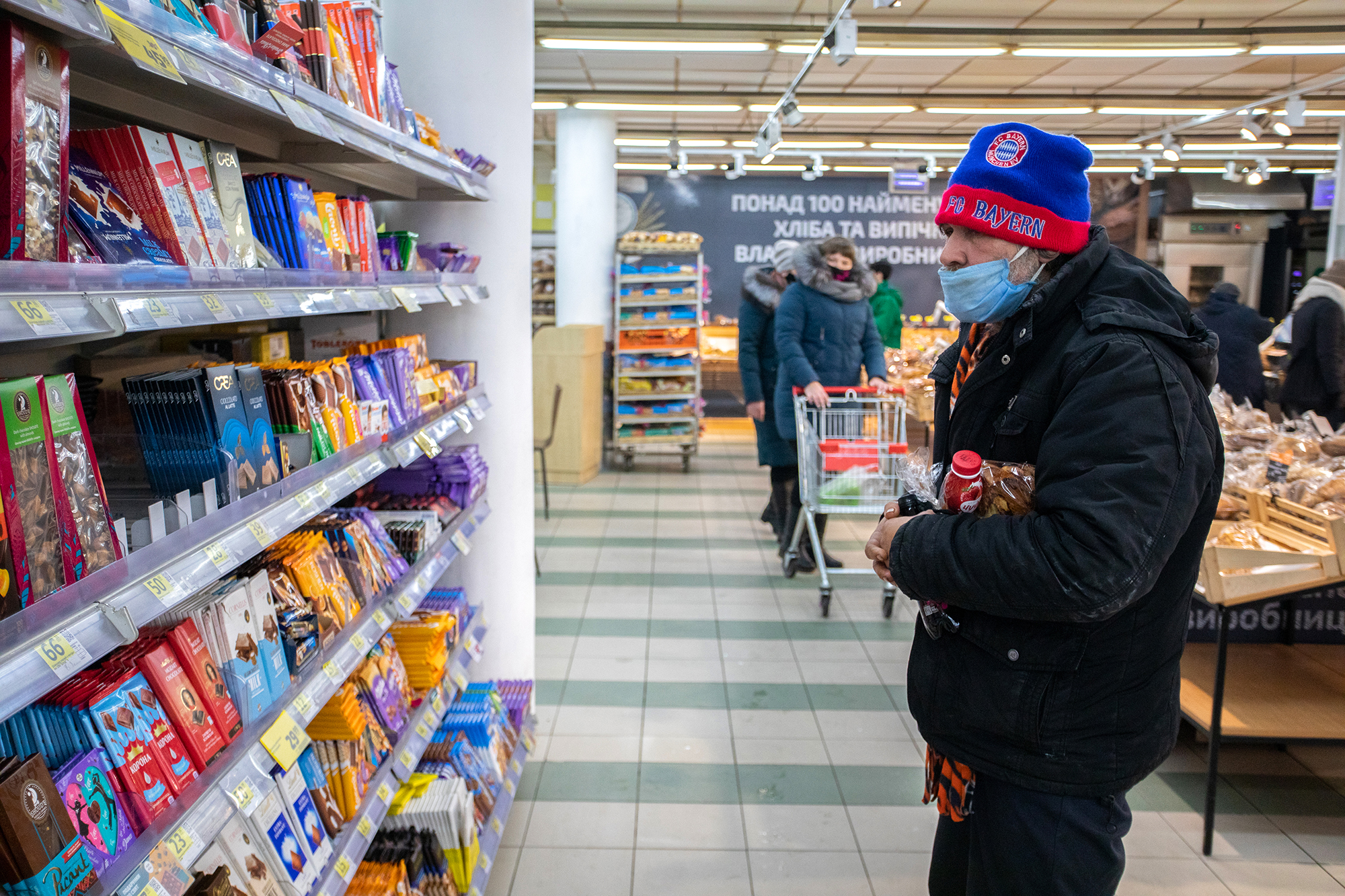
In Internatsionalny Park we notice a bunch of elderly, poorly-dressed people carrying shabby plastic bags. As we stand a bit aside, Hennadii smokes and talks to us about photography. He remembers that his father also liked to take photos. Yet, he does not have to prove to us that he is a human being.
The crowd grows, herding together into a chaotic queue. The volunteers arrive in a white bus.
“Happy Valentine’s Day!” someone greets the people.
The crowd bursts into peals of laughter.
The volunteers hand out tokens with serial numbers. Today Hennadii will be the fourth to eat.
Apart from food, they brought warm clothes. His blue and red hat disappears from view. After a while, Hennadii emerges from a suffocating mixture of soiled jackets and coats with a pair of aluminum foil insoles.
***
“We would like to remind you once again,” a volunteer walks along the crowd so that everyone can hear. “After eating, do not leave your garbage here. Also, relieve yourselves somewhere else. We don’t want to be shooed away, do we?”
No, we do not. People respond with approving hum.
While Hennadii receives his portion of food, a volunteer approaches us.
“Why are you taking photos?”
We explain who we are and what we do.
“Oh, I see,” he says. “I asked because many residents of the surrounding apartment buildings are against such people gathering in their neighborhood.”
Hennadii’s meal includes a full lunch: soup, potatoes, bread, a small pack of cookies and sweets.
“Enjoy your meal!” we say. At this temperature, everything cools down quickly.
“Thank you,” he replies. “I will have it later.”
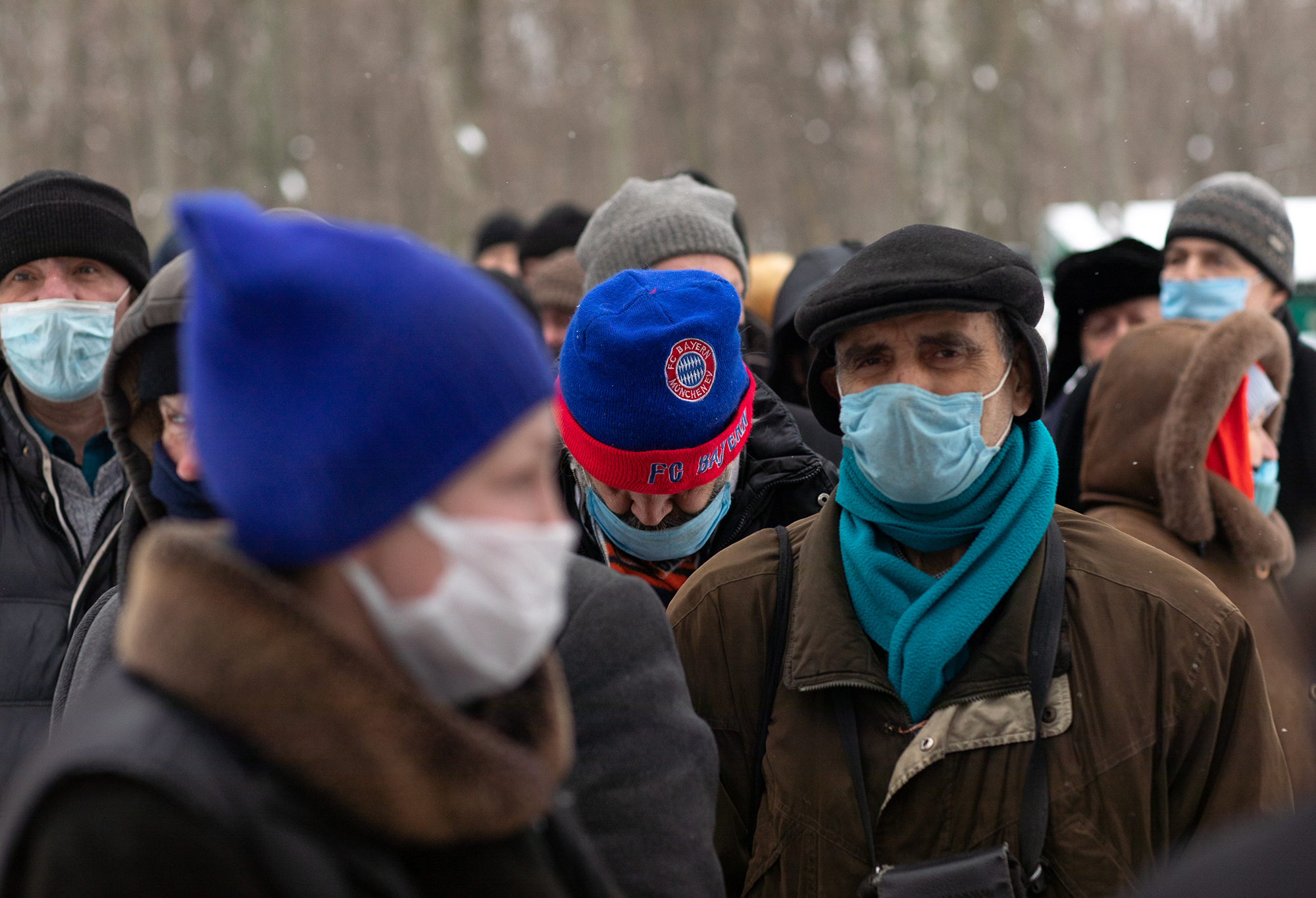
When we first met him, Hennadii was a single and childless man and, when it was time to say goodbye, he had turned into a divorced father to a 21-year-old son. In the supermarket, in addition to chocolate, he opted for a quarter-liter bottle of Morosha vodka. And a pack of Winston with two capsules. In fact, it is unknown why he is living on the street. But the guilty and the innocent freeze just the same. So, going to bed, I quietly say:
“Good night, Hennadii.”
[This story was created with support of the Royal Norwegian Embassy in Ukraine. The views and opinions expressed in this publication are those of the authors and do not necessarily reflect the official position of the Norwegian government.]
Have read to the end! What's next?
Next is a small request.
Building media in Ukraine is not an easy task. It requires special experience, knowledge and special resources. Literary reportage is also one of the most expensive genres of journalism. That's why we need your support.
We have no investors or "friendly politicians" - we’ve always been independent. The only dependence we would like to have is dependence on educated and caring readers. We invite you to support us on Patreon, so we could create more valuable things with your help.
Reports130
More





